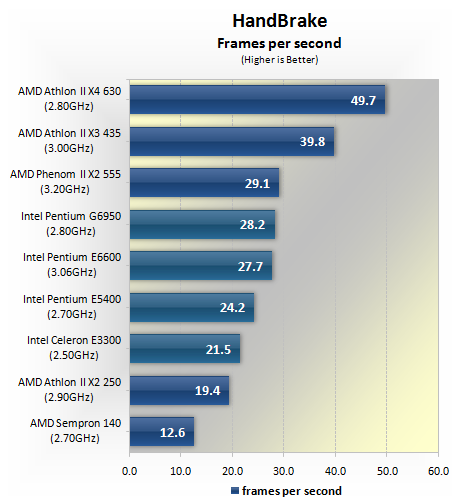Encoding Performance

Using HandBrake we converted a 560MB mkv file to the mp4 format and measured the frame rate each processor was able to achieve. Processors with multiple cores will have a natural advantage in this test as we have found HandBrake can utilize up to six cores.
It was no surprise that the Athlon II X4 630 dominates this test. This processor was around 25% faster than the Athlon II X3 435, which itself was more than twice as fast as the Athlon II X2 250 in spite of having just one extra core and a 3.5% frequency advantage. The Phenom II X2 555 was 1fps faster than Intel's best performer in this test, the Pentium G6950.

The x264 HD Benchmark 3.0 is used to measure the performance of a 2-pass 1280x720 encoding, displaying the results in a frame per second format. The outcome was similar to what we saw in the HandBrake test, with the Athlon II X4 630 coming out on top. This time it only beats the Athlon II X3 435 by an 8% margin, though. The Athlon II X3 435 was 34% faster than the Athlon II X2 250.
The Athlon II X2 250 beat all four Intel processors, leading the Pentium E6600 and G6950 by a 5% margin. The Sempron 140 managed just 19.9fps, making it 37% slower than the Celeron E3300, which was Intel's slowest CPU.

Using TMPGEnc 4.0 Xpress we converted a 715MB avi file to the mpg format and measured the time it took for each processor to complete this task. The Athlon II X4 630 is the best choice here, taking just 11 minutes and 5 seconds. The Athlon II X3 435 was second best again, followed by the Phenom II X2 555 that just edged out the Pentium G6950.
The Athlon II X2 250 beat the Pentium E6600 by a fraction, while the Pentium E5400 and Celeron E3300 processors were considerably slower. The Celeron E3300 in particular was quite a slug, taking 21 minutes and 35 seconds, but the Sempron 140 might actually put you to sleep with a conversion time of 36 minutes and 48 seconds.